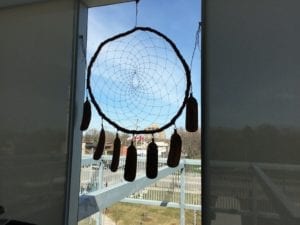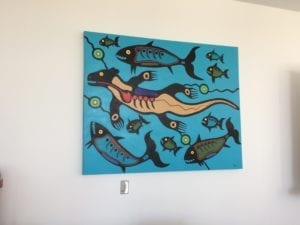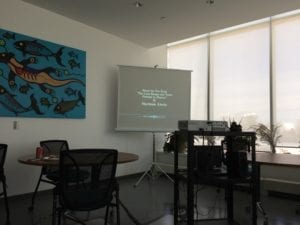Smoke Signals (1998) is adapted from a short story in The Lone Ranger and Tonto Fistfight in Heaven (1994)

Dream Catcher in window at Aboriginal Resource Centre at Humber College Lakeshore Campus. Artist: Brian Klyne
I have an interest in learning about the First Nations history of Long Branch (Toronto not New Jersey).
The human story of the area, where I have lived for 20 years, began about 10,000 years ago when Palaeo-Indian nomadic hunters first arrived in Southern Ontario at the end of the last Ice Age.
After the arrival of European settlers in Long Branch, most of the forests that had existed for 10,000 years in the area were soon gone.
I seek to get a sense of the context for the story that began at the end of the last Ice Age. I know for sure that histories written in the tradition of the European settler societies, however valuable they may be, will not give me as good a sense of the First Nations story. I need, instead, to learn from Indigenous sources. It’s taken me many years to realize that I have to take steps, on my own, to become educated in ways that will, of necessity, be new for me.
On April 13, 2017 I had the good fortune to attend a screening of Smoke Signals (1998) at the Aboriginal Resource Centre at the new Humber College Lakeshore Student Welcome and Resource Centre at the corner of Kipling Ave. and Lake Shore Blvd. West in New Toronto.
The film, which has received highly positive reviews, is based on a short story by Sherman Alexie, “This is What it Means to Say Phoenix, Arizona,” from The Lone Ranger and Tonto Fistfight in Heaven (1994).
I look forward to reading the latter book, as well as a Blasphemy: [new and selected stories] 1st ed. (2012) by the same author.
I also look forward to attending future events at the Aboriginal Resource Centre.
My approach to the study of the First Nations experience is straighforward. I want to begin by acquainting myself with the work of Indigenous authors and filmmakers.
I am pleased that such an opportunity is available, through sources such as the Aboriginal Resource Centre on the third floor of the Humber College Lakeshore Campus.
Smoke Signals (1998)
A blurb at the Rotten Tomatoes website sums up the story succinctly: “The unavoidable synopsis – two young American Indians leave the reservation to resolve their problems and to find themselves – belies the poetry of this well-acted, well-directed and largehearted movie.”
I much enjoyed the movie. The dialogue at the start was a delight, to my ears. It took hold of my attention. I was getting the perspective of a non-settler take on the meaning of life in North America. That was a good experience for me. The dialogue worked well all the way through. The story was put together beautifully; it had a good pace, the characters came to life. The journey depicted in the film – and the ending – made sense. I’m really pleased I saw the film.
The people I met at the event were welcoming and ensured that, as a newcomer, I felt right at ease. The snacks were great, as well. In every way, it’s a great setting to watch a movie, with a focus on a First Nations perspective on the experiences of life that all of us share.
I look forward to continuing on my own journey, of learning about things that I had only thought about getting around to learning, until recently. I want to learn more about the story – and the context of the story – of the previous 10,000 years of Long Branch, Southern Ontario, and the rest of the world. And I want to better understand how that story relates to the here and now of the challenges facing us as a Planet.
Updates
An April 17, 2017 CBC article is entitled: “‘It scares me’: Permafrost thaw in Canadian Arctic sign of global trend: Buildings in Inuvik being demolished because of shaky foundations.”
An April 23, 2017 Big Think article is entitled: “Discovery of North America’s Oldest Settlement Proves Native Canadian Legend True.”
A Nov. 21, 2012 New York Times article is entitled: “Without Reservation: ‘Blasphemy,’ by Sherman Alexie.”
The opening paragraph reads:
In his 1936 essay “The Storyteller,” Walter Benjamin drew a sharp distinction between prose fiction, meaning novels and short stories, and actual storytelling, meaning spoken narratives passed from one individual to another. The essential quality of storytelling, Benjamin wrote, is lived experience: “Every story contains, openly or covertly, something useful . . . a moral; some practical advice; a proverb or maxim. In every case the storyteller has counsel for his readers. But if today ‘having counsel’ has an old-fashioned ring, this is because the communicability of experience is decreasing. . . . We have no counsel either for ourselves or for others.”
[End]
A May 9, 2017 Toronto Star article is entitled: “Shelley Niro wins $50,000 Scotiabank Photography Award: Niro, an indigenous artist hailing from Six Nations Reserve, unpacks colonial trauma with irony and humour.”




An April 15, 2017 CBC article is entitled: “Perception of Indigenous health doesn’t match reality, says award-winning anesthesiologist: Indigenous communities have some flexibility and may be able to exert own jurisdiction, he says.”
The concluding paragraphs read:
He says Indigenous communities may have the right to license their own physicians on reserve but those rights have not been exercised. Lafontaine said Indigenous communities still maintain jurisdiction and can exert it outside of existing provincial and federal legislation.
“In that context, I think First Nations really have the flexibility to do things that are different than other parallel systems like medicare,” Lafontaine said.
[End]